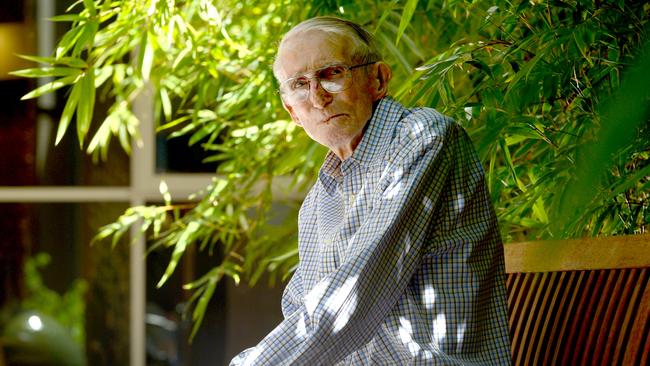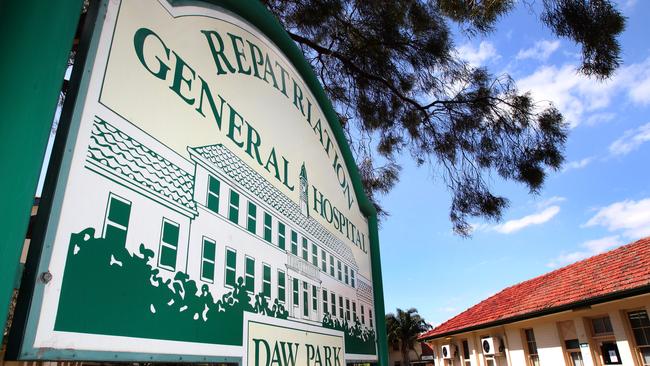Nurses angry over health plan, other groups cautiously in favour but want details
THE State Government has announced major reforms to SA’s health system, and the Health Minister has answered your questions. Replay our live chat here.
HEALTH Minister Jack Snelling is vowing to free up hospital beds by getting patients home in a more efficient timeframe through revolutionary changes to the health system.
Answering Advertiser.com.au readers’ questions in a live blog this afternoon, Mr Snelling also said 40 new beds for people waiting for aged care would ease pressure on hospitals.
Mr Snelling yesterday unveiled the Transforming Health plan, which proposes to close the Repatriation General Hospital and Hampstead Rehabilitation Centre, create three metropolitan “super” emergency departments and downgrade emergency services at three other hospitals.
Asked how many jobs he intended slashing at the Repat, Mr Snelling declared: “No one at the Repat is going to be sacked as part of Transforming Health.”
Asked why the new Royal Adelaide Hospital was taking longer than expected to build and going over budget, Mr Snelling said: “We are still working on the hospital being completed by April 2016. However, it may be that the builders don’t have the hospital completed until later in 2016.”
One reader asked Mr Snelling how increasing the distance patients needed to travel for emergency services would help their health outcomes.
“It is more important to get to the right hospital for the care you need rather than always the closest hospital,” he replied.
READ THE LIVE BLOG QUESTIONS AND ANSWERS HERE
This morning Mr Snelling admitted people were “dying at the moment”, or had been failed in other ways as a result of inadequate health care at the state’s hospitals.
He gave the example of Tom Bunning, now 28, who has a brain injury, which means he can’t talk or write as a result of a car accident eight years ago.
“When Tom had his accident he was taken into hospital (and) he was in over the weekend and the simple fact is we didn’t have the senior clinicians on staff there at the Royal Adelaide Hospital to give the appropriate care that Tom needed, Mr Snelling said.
“As a result of that, the care was substandard and he ended up with quite an avoidable brain injury which has obviously had a devastating impact on his life and for his mother and his family.”
After Mr Snelling’s press conference, a Flinders Medical Centre patient confronted him out the front of the hospital.
Janet Richardson, of Morphettville, said she was concerned about plans to close the Repatriation General Hospital.
“I’m very concerned about the fact Ward 17 in the Repat is being closed down,” she said.
“Everyone at the Repat are fabulous ... in a cold environment at Flinders or the QEH or anywhere else, they’re not going to improve.”
Mr Snelling told Ms Richardson the State Government has plans to build a new Ward 17, which is currently used to treat patients suffering from post traumatic stress, at a yet-to-be-decided location.
“We’re going to talk to vets about the best place to put it,” he said.
Her concerns come as Mr Snelling admitted some staff at the hospital were worried and “upset” about the government’s decision to close it.
“I’ve been down at the Repat this morning talking to staff and of course many of them are very upset,” he said.
“Can I just assure staff at the Repatriation General Hospital that no one is going to lose their job - we’re going to try and keep the clinical teams there together as much as possible.”
“They (the staff) want to be kept together (because) in many instances they have worked together, they want to protect that as much as they possibly can and we’ll make sure those wishes are protected as much as we possibly can.”
The scaling down of Noarlunga Hospital’s emergency department to non-critical care is another issue that has been widely criticised since the announcement.
Mr Snelling said the decision to move patients requiring emergency services to the state’s three major hospitals would ensure they get the best possible outcomes and care.
“We’ve got people dying because they’re going to Noarlunga and Noarlunga is not able to look after them because it’s not a fully resourced emergency department at the moment.”
“We have to ensure people go to the right place the first time and has the 24 hour cover so they can be appropriately looked after.”
Nurses angry over health plan
Under the drastic reforms, the Government plans to:
CLOSE the Repatriation General Hospital and Hampstead Rehabilitation Centre;
UPGRADE the emergency departments of the Royal Adelaide Hospital, Flinders Medical Centre and Lyell McEwin Hospitals’ to “super EDs”;
DOWNGRADE emergency departments at Modbury and Queen Elizabeth Hospitals and reduce Noarlunga’s to a walk-in service bypassed by ambulances;
REDUCE the number of acute-care beds;
DIRECT elective surgery to Noarlunga (day surgery) the QEH (multi-day) and the RAH (complex, multi-day).
Other changes include consolidating stroke services at the three major EDs and rehabilitation services at five hospitals, each with specific areas of care.
ANMF chief executive Adjunct Associate Professor Elizabeth Dabars was scathing about the plan, which may see nurse numbers cut.
“There is no clarity or comfort in how the three main EDs will manage with additional loads when they are already under significant pressure,” she said.
Opposition health spokesman Stephen Wade said the proposals were about saving money.
“There will be four different types of EDs. Almost half of people go to EDs under their own steam rather than being judged by an ambulance paramedic on where to go,” he said.
“At the moment they just go to their local ED, but now they will have to self-diagnose how serious they are, know where the relevant treatment centre is and make their way there. This is a risky model.”
Australian Medical Association SA president Dr Patricia Montanaro welcomed the plan’s concepts, but warned the complexity would be in the detail.
“This should not be about cutting costs or closing hospitals or beds, it should be about fixing the system,” she said. “This is a bold step and we welcome the debate.”
Australasian College for Emergency Medicine SA spokesman Dr Sam Alfred said splitting acute and elective surgery, splitting chronic and acute rehabilitation and contracting 40 beds to shift people ready for discharge but awaiting aged care accommodation will ease pressure on EDs.
“We support dramatic change, as we have been suffering the death of 1000 cuts,” he said. RSL state chief executive Mrs Sam Jackman said many veterans would be said to see the closure of the Repatriation General Hospital.
“The key issue for the RSL is that services required by veterans are maintained,” she said. “Where they are is not the major concern so long as there is access.”
SA Salaried Medical Officers Association spokeswoman Bernadette Mulholland said: “We need change but there is concern about whether this is the right direction — we don’t have enough information to really analyse it.”
City of Onkaparinga Mayor Lorraine Rosenberg said “it was difficult to see logic” in the decision to downgrade services in an area of population growth.
Repat saved Bill, but now it can’t be saved
BY AMELIA BROADSTOCK
WHEN Bill Schmitt returned from World War II in 1945, after spending years starving in a Japanese prisoner of war camp, it was the Repatriation General Hospital that saved his life.
Captured in March 1942, and released in August 1945, Mr Schmitt weighed just 42kg on his return to Australia. The then 27-year-old spent 12 months in and out of the Daw Park hospital recovering from his time at war.
“I was one of the fortunate ones,” Mr Schmitt, now 96, said.
My determination was just to live for the next day and hope that we’d get home … that’s what kept me alive.
“The hospital got me fit enough to go back to work. It was a long road but I made it.
“I’ve used a lot of the services offered by the Repat, particularly the hospital and rehabilitation services when I’ve needed it.”
But the hospital is now earmarked for closure.
The Repat, along with the Hampstead Rehabilitation Centre, will close and services will be diverted to larger hospitals as part of the State Government’s major health system overhaul.
Mr Schmitt — who lives at the aged care home, ViTA, co-located on the hospital site — said the closure was a “big blow” to the veteran community.
The TPI Association of South Australia — a service organisation for totally and permanently incapacitated ex-servicemen and women — was shattered.
TPI veterans visitation SA co-ordinator Mick Curry said the changes were more “broken promises” from the Government.
“Veterans’ health needs to be put first,” Mr Curry said.


